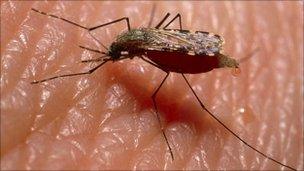Jet lag found to hinder malaria parasite
- Published

Malaria is spread by the bite of the mosquito
The parasite which causes malaria is poor at spreading the disease if it is jet lagged, research has suggested.
Edinburgh University experts gave the parasites "jet lag" by inserting them into mice whose body clocks were different to their own 24-hour cycle.
Some of the mice were awake in the daytime and others active at night.
They found malaria was only half as effective at causing infection and spreading disease in mice which had a different routine to the parasite.
The study gives scientists a greater understanding of when malaria parasites are at their most harmful and when they are vulnerable.
'Clever tricks'
The scientists said the findings may also be a useful aid in developing treatments to tackle the disease.
Dr Sarah Reece, of Edinburgh University's school of biological sciences, who led the research, said: "For this study, we effectively gave the parasites jet lag.
"Our findings suggest that parasites have developed some clever tricks to get their timing right and cause an infection.
"This is rare evidence that organisms whose body clock is in sync with their environment have a better chance of survival.
"The more we know about how malaria parasites work, the better equipped we will be to tackle them effectively."
Internal body clocks, found in most living things, are determined by patterns of daylight and darkness and govern a range of functions such as sleep cycles, blood pressure, and physical strength.
Malaria, which is spread by the bite of the mosquito, kills one million people each year in sub-Saharan Africa. It affects hundreds of millions more.
The research was carried out at the universities of Edinburgh and Oxford.
The study was funded by the Wellcome Trust and the Royal Society and published in Proceedings of the Royal Society B.
- Published11 October 2010
- Published2 October 2010
- Published20 May 2010